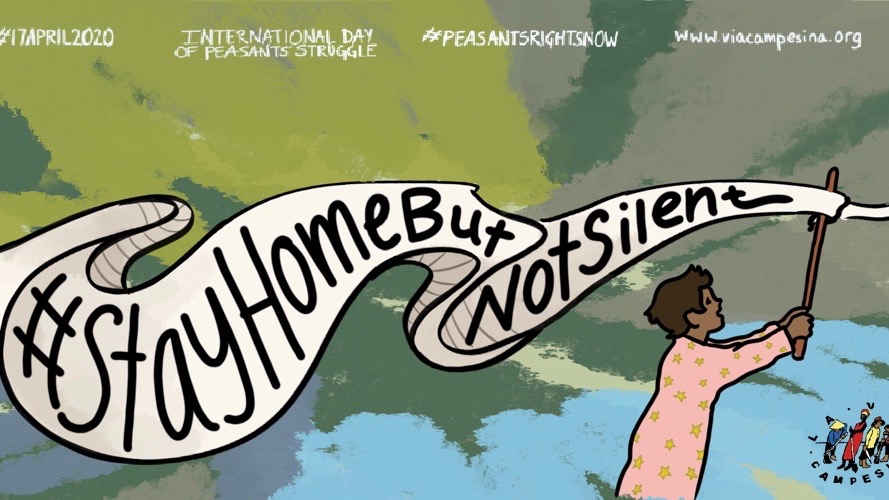Today, April 17, is the International Day of Peasant Struggle. Millions of peasants around the world celebrate this day since 1996. Faced with the COVID-19 pandemic, La Via Campesina has issued the slogan, ‘stay home but not silent – in the times of pandemic, peasants are united to feed the people.’ Our 180 member organizations in 80 countries observe this day to commemorate the massacre of 19 peasants struggling for land and justice in Brazil in 1996. This is the day when LVC members celebrate the struggles of peasants and small-scale farmers for their rights.
The current economic system has come together with the COVID-19 pandemic to trample the lives of peasants. With their humanity challenged by COVID-19, peasants are not silent. At a time when the borders are sealed, industries and transport are closed and most people in the world are under lockdown, but the peasants are not silent. While maintaining physical distances, peasants have continued to work on their farms and supply food to the world. Peasants are small-scale food producers who rarely rely on external inputs, markets, labor and transport. They are not silent but united to feed the world. They are not silent, they are defending agroecology and food sovereignty. They are not silent, they are saying that capitalism is the crisis. They are also saying the peasant agriculture is not only eco-friendly, healthy and humanitarian, but can also feed the world. They are saying, it is time to change the system and move to a localized food system and food sovereignty.
Why peasant agriculture?
The capitalist world is full of contradiction and paradox. Along with increasing inequalities, this system lives with the paradox that small food producers; peasants, landless, rural workers, herders, forest dwellers, pastoralists, fisher folks and people living in rural areas who produce more than 70% of the world’s food in harmony with nature do not get a dignified life. Those who want to use agriculture for profits continue to advocate commercialization, industrialization and corporate farming. Peasants continue to be sidelined by mainstream policies of neoliberal capitalism, highly neglected, and excluded from so-called politico-economic development. Unfortunately, the same population constitutes the majority of people living with poverty and hunger, suffer from violence, displacement and marginalization and lack access to and control over resources. If we see the reported statistics too, they are not only the primary victims of civil and political rights violations.[1] but even victims of inhuman seed laws, profit-oriented agricultural policies, dispossession due to multinational corporations and chemical farming practices. There was nothing to protect the rights of peasants under international law or human rights instruments.
Peasants rights declaration
We know about various United Nation’s instruments to protect the right of people and communities such as Universal Declaration of Human Rights (UDHR, 1948), Covenant Economic and Socio-Cultural Rights (CESCR, 1966), Rights of Disabled Persons (1975), Indigenous People Rights (2007), Viena Declaration (1993), ILO 169, Refugee Rights (1951), Women Rights (CEDAW, 1979), Children Rights (1989) etc. These international instruments have played an important role to protect the rights of respective groups and in many cases with clear legal provisions at national level. However, in the case of small food producers, who are mainly the victims of systemic and structural crises, these UN Standards were insufficient. That is why and how, UN Declaration on the rights of peasants and other people working in rural areas (UNDROP) came into existence.
The journey of the UNDROP was started from the small village in Indonesia almost 17 years ago. After many years of struggle even at UN agencies, on December 17, 2018; United Nations General Assembly[2] approved the UNDROP. This Declaration is now a historic document. The rights enshrined under the Declaration are not just of farmers but also fisherfolks, pastoral communities, indigenous people, migrant and seasonal workers, dairy workers, rural women and youth etc. It recognizes all of them as a rights holder (individual & collective) and provides for various protections from the State. Through this Declaration, millions of peasants around the world will be able to reclaim their rights to feed their families and communities, as it recognizes the fundamental role of small-scale food producers while also offering them tangible prospects for decent working and living conditions, consequently making this world a safer place for peasants.
The instrument will bridge the legal gaps with regard to the protection of peasants’ rights and of other people working in rural areas at the international human rights level. Though it is not legally binding, it is sufficient to argue in legal instances at all levels. For peasant movements, this new instrument can be an important point of reference in their local struggles for seeds, land, or better working conditions.
Stay home but not silent
The pandemic of COVID 19 has hit the world. The world is learning many lessons, which includes the threat of industrial livestock, the present food and agriculture system can not work and capitalism has failed to deal with pandemic. Other examples from countries like Vietnam, China and Cuba with better public health services and socialist bases, which are effective in their fights as well as countries with localized food system has less impacts on supply of food and other essentials, demand shift in our model of development. Therefore, it is important that we change the present regime of food and agriculture and reclaim agroecology and food sovereignty.
Pramesh Pokharel is a Marxist political activist associated with All Nepal Peasants Federation and is the current Youth ICC member of La Via Campesina for Asia region.
[1]In 2017 only, around 1000 peasants were killed in many parts of world including 57 from Brazil
[2]The Third Committee (Social, Humanitarian and Cultural) of the UN General Assembly voted in favour of the UN Declaration on the rights of peasants and other people working in rural areas, through the Resolution no. A/C.3/73/L.30.





